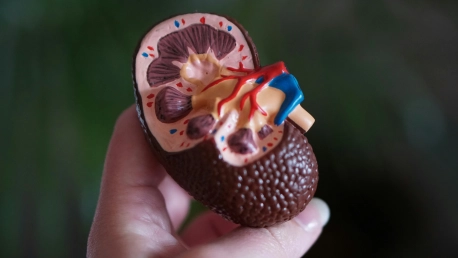In the fight against kidney cancer, ALLO-316, created by Allogene Therapeutics, stands out in the vanguard with its CAR T-cell therapy. This breakthrough offers new hope against renal cell carcinoma (RCC), a type notorious for its defiance against traditional treatments. As ALLO-316 progresses through clinical trials, it’s poised to shift the paradigm in RCC care. This therapy specifically targets CD70, a prevalent antigen on RCC cells, promising a precise and formidable weapon in eradicating this formidable cancer. The progress of ALLO-316 is bolstered by strong financial support and regulatory optimism, marking a pivotal step in cancer treatment. Its targeted approach capitalizes on the latest in immunotherapy techniques, making it a cornerstone of hope for patients with RCC.
A Glimmer of Hope: The Promise of ALLO-316
RCC’s reputation for being notoriously resistant to treatment casts a shadow over the lives of many patients. However, ALLO-316 shines as a potential game-changer. With a $15 million grant from the California Institute for Regenerative Medicine, Allogene Therapeutics is pioneering an approach that utilizes CAR T-cell therapy in a way previously unseen in solid tumors. The central strategy revolves around the antigen CD70, which ALLO-316 targets selectively, aiming to improve the body’s response to treatment by evading immune rejection. The initial clinical trials offer a hint of the potential that lies within ALLO-316, serving as a beacon for patients afflicted by RCC and possibly marking the beginning of a new era in cancer therapy.
The TRAVERSE Study: Laying the Groundwork
The currently ongoing Phase I TRAVERSE clinical trial serves as the proving ground for ALLO-316, meticulously examining its safety, tolerability, and initial efficacy. The funding from CIRM is not simply a monetary boost but also a means to expand the trial’s reach, allowing more diverse patient populations to participate in the trial, thereby ensuring broader access to this innovative therapy. With each positive trial result, ALLO-316 inches closer to setting a new paradigm for managing RCC, potentially establishing itself as the treatment of the future.As the study progresses, preparatory efforts are in place to transition smoothly into the next phase. These efforts include instruments of analysis to solidify a Phase II trial regimen. The success of the TRAVERSE study is not just about ALLO-316 alone; it represents a broader potential shift in the therapeutic landscape for RCC, promising a better future for those battling this relentless form of cancer.
FDA Fast Tracks ALLO-316: A Sign of Merit
The U.S. Food and Drug Administration’s (FDA) fast track designation for ALLO-316 in March 2022 signifies a major vote of confidence in its potential. This accelerated status is reserved for therapies addressing urgent and unmet medical needs, such as those presented by RCC. With the faster development and review processes made possible by the designation, ALLO-316 could soon provide relief to patients who have long awaited a viable treatment approach. The endorsement is symbolic; it resonates with a sense of urgency and an expectation of significant impact.This FDA support is not simply procedural; it is a recognition of the innovation and potential embodied by ALLO-316. It echoes the need to push boundaries and translates into a commitment to bring new treatments to patients in an expedited manner, thus demonstrating an acknowledgment of the gravity and significance of this therapeutic advance.
Strategic Focus: A Calculated Direction
Allogene Therapeutics has recently refocused its clinical efforts, halting two Phase II studies to prioritize ALLO-316 for use in renal cell carcinoma (RCC). This pivot underscores their dedication to fighting cancer with targeted off-the-shelf cell therapies. ALLO-316 could be a game-changer in cancer care, embodying the shift towards personalized and precise treatments. Allogene’s strategy reflects a belief that the next wave of oncology will heavily feature treatments tailored to individual patient needs. By concentrating on the promising potential of ALLO-316 as a first-line consolidation treatment, Allogene not only pushes the boundaries of current cancer therapies but also champions a future where improved patient outcomes are the standard. This approach could significantly impact the paradigm of cancer treatment, affirming the value of focused and adaptive research strategies in the healthcare industry.









